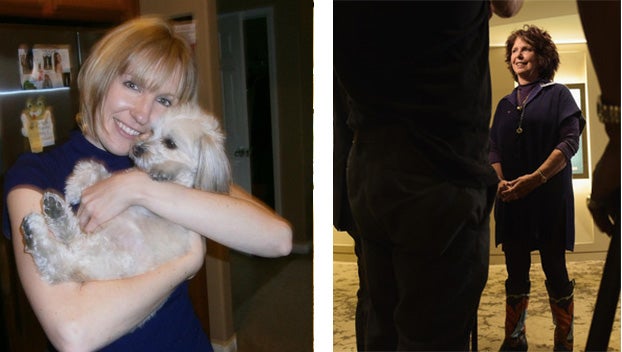Two women become victims of extreme control. One survives.
Published 10:51 am Wednesday, October 28, 2020

- Tara Wolfe, left, and Kit Gruelle
By Ann Marie Cunningham
Mississippi Center for Investigative Reporting
Tara Klimez Wolf stood pumping gas at the Stop-N-Go, gazing out at the heat shimmering over the Nevada desert. She really was leaving Las Vegas.
After recapping her gas tank, she leaned inside the open window of her green Kia and asked her mother, “Want a snack?”
January 2015 was the start of a new year, and Tara Wolf was leaving a life she loved. She had a husband of eight years whom she adored. From New Jersey, Thomas William Wolf had a disarming smile and wore his black hair like a cast member of Jersey Shore, the reality show.
She had no idea what awaited her in Mississippi.
Troubling signs
Tara felt like she had hit the jackpot when she met Tommy in 2006. She hadn’t dated much, and he showered her with attention, more interested in her than any man she’d ever met.
A year later, the couple tied the knot in Las Vegas, where Tommy celebrated by gambling. There were troubling signs, but they seemed small. Tommy refused to let any family member attend the wedding except his own brother, his best man.
In February 2008, Tara’s mother, Maureen Berry, and her stepfather, Michael, who lived in Ontario, Canada, were allowed to visit the couple. Maureen brought along a packet of clippings from Canadian newspapers about people Tara knew. In Tara and Tommy’s new apartment, Maureen left the stack on the kitchen counter. When she returned, Tommy had thrown them all away, saying, “I don’t like clutter in my home.”
Maureen didn’t object, worried that he would take it out on Tara after they left.
When control becomes extreme, violence can follow
Domestic violence doesn’t always start with violence, advocates and survivors say; it begins with extreme control. Australian investigative reporter Jess Hill, author of a new book, See What You Made Me Do, prefers the term “domestic abuse.” Hill’s title refers to an abuser viewing himself as the victim. She cites studies that say when control becomes extreme, violence can follow.
Extreme control, enforced by verbal threats, may not sound criminal. But their effects on the victim can be worse than bruises and broken bones. Some countries, including England, Scotland and Wales, have made such extreme control a crime. In the United States, it’s illegal only in California.
After the romantic “honeymoon phase,” experts say, a controlling partner isolates a woman from her family and friends.
Kit Gruelle’s husband, Jack, was a very handsome man with long blonde hair past his shoulders. He wooed her with Poco, a German shepherd he rescued from a Maryland farm. Then he took her to live in the mountains of North Carolina near Asheville, far from any neighbors. He hung over her shoulder as she stirred and stirred and stirred whole eggs into dry powdered milk: “Poco’s had worms; he’s been starved. He has to have it mixed real good. Real good.”
‘Where are you? What are you doing? What’s going on? Where’re you at?’
Leaving Las Vegas seemed pointless to Tara. She had a rewarding job working at a clinic for diagnostic medical imaging, where celebrities like Celine Dion sometimes dropped in, and Tommy had an enviable job in casino security. She loved her small animals and her garden, where she experimented, figuring out what would thrive in Nevada’s desert climate.
Then in late 2015, Tommy found a better-paying job at Hollywood Casino near Tunica, Mississippi. He started working there right away and found a house for rent in Southaven, a bedroom suburb just over the state line from Memphis.
Tara agreed to move to Mississippi. She invited her mother, Maureen, to accompany her on the road trip from Las Vegas to Southaven. She took cuttings from her beloved garden and stowed them in her Kia, along with her cockatiel in a cage and her two small mixed-breed dogs in seat belts.
The sun was high when Tara needed gas and pulled into the Stop ‘Go in southern Nevada. After filling her tank, she asked her mother if she wanted anything to eat or drink.
“I’d love an orange juice,” Maureen replied. “And maybe some chips.”
Tara walked into the Stop ‘n Go, paid for her gas, and returned to the Kia carrying a small plastic bag of Maureen’s requests.
As the two women pulled out onto the highway, the phone rang — again.
Maureen had noticed that since they had embarked on their road trip, “Tommy had called constantly: “Where are you? What are you doing? What’s going on? Where’re you at?” When they had stopped for gas, Maureen had waited on a bench while Tara walked the dogs in circles, her head down, responding to Tommy over the phone: “Yes … yes … yes … yes …”
In the car, Maureen listened as Tommy continued, “So, Tara, I see you spent $15 at the Stop-N-Go. Gas was $1l. What were the other $4 for?”
“Orange juice and nachos.”
“Oh. Orange juice and nachos? What did you get that for?”
“That was for my mother.”
Tommy complained, “Did you really need that?”
Tara never answered.
All he had to do was instill fear
Jack had begun going out at night to carouse and pick up women. He told Kit he needed other women because she was so inadequate sexually. She felt crushed. He had her groom his long hair with specific products before he went out, so he’d be more attractive.
Before Jack started his evening, he also liked a bowl of ice cream with peanuts. He had Kit buy peanuts, rinse them repeatedly, drain them in a colander, pat them dry, and scatter them on his ice cream. If he tasted any salt at all, he would beat Kit. She thought about going to the police, but realized they were unlikely to believe her if she told them, “I didn’t wash the peanuts.”
Jack didn’t stop there. He brought women back to the house and had sex with them while he made Kit sit in an upstairs room. He always came up to make sure she was awake and could hear what was happening downstairs.
Jack didn’t have to use violence; all he had to do was instill fear of violence in his wife.
‘Stop spending money!’
Tommy was always watching. He had charge of Tara’s paycheck and monitored her bank account and all her purchases. Tommy wouldn’t allow Tara to spend money at her job to join staff lunches. He insisted on making her lunch; she had to take it to work and eat it, not the group lunch.
After the couple moved to a house in Las Vegas, her mother discovered Tommy had at least one camera there, ostensibly to keep tabs on Tara’s two dogs while the couple were at work.
For almost all of the next eight years, Maureen recalled, “Mike and I had a phone relationship with Tara.” Even if she were alone at home, Tara dodged Maureen’s questions about how she was. Perhaps she knew her phone conversations were being recorded.
“It’s all good, Mom. Love you! Say hi to Mike for me. Gotta go!” became Tara’s signature sign-off.
After the move to Mississippi, Tara went to work at a veterinary clinic in Memphis. There, staffers say Tommy forbade Tara to join group lunches, as he had done before in Las Vegas..
In September 2015, she was rear-ended in a car accident and was hospitalized with a back injury. In her first month at her new job, her back was causing her so much pain that one day she asked her supervisor if she could go home.
The supervisor reports that she answered, “Yes! Please do! You’re not well.”
Tara replied she had to call Tommy first. According to her supervisor, Tommy maintained she wasn’t in that much pain, and he would not allow her to leave work.
Kit attempted suicide
Experts point out a perpetrator’s simple question about money usually is designed to induce dependency, debilitation and dreadful fear in his victim. An observer who hasn’t gone through this coercive control may have trouble imagining the degree of exhaustion, anxiety and despair a victim may feel after being subjected to endless questioning, day in, day out, year after year.
Not surprisingly, studies show as many as 69 percent of those victimized by domestic violence or abuse suffer suicidal thoughts, compared to less than 19 percent of those who don’t.
By 1979, Kit and Jack had two young sons, Matt and Jason. When Matt was 4 and Jason only 14 months old, Kit attempted suicide with an overdose of muscle relaxants she had been prescribed for “nerves.” Jack found her collapsed outside on their driveway. Instead of helping her up, he held her down, telling her she would die, she would be ruled a suicide and he would “get everything.”
The couple never had visitors — until that day, when a friend of Kit pulled in. Jack jumped up and asked for her help rushing Kit to an emergency room. There doctors made her drink ipecac, and she vomited up all the muscle relaxants she had swallowed.
Later, a male counselor came into her room and asked her, “Why did you want to commit suicide?” But Jack was waiting outside, so she didn’t answer.
‘Tara’s dead’
On the afternoon of Oct. 1, 2016, Maureen says she phoned Tara and spoke to her for 45 minutes. She found her daughter happy and enthusiastic about looking for a new house in Mississippi. The pair looked online at several enticing possibilities.
Then in the early hours of the next morning, the Berry phone in Ontario rang. Mike picked up.
“Hello?” Mike answered.
“Mike. It’s Tommy.”
“Tommy! What is it? What’s wrong?”
“Uuh…Tara’s dead.”
“What?? What do you mean, Tara’s dead? Maureen just spoke to her a few hours ago! She was fine. What happened? How do you know? Where are you?”
Tommy said he was visiting his family in South Carolina and couldn’t reach Tara. So he called the Southaven police and asked them to check on his wife. The police looked through a window and saw Tara lying on a bed in a guest room.
Tommy said, “She shot herself with my f–king gun.”
Tommy didn’t hold a funeral for Tara.
He did not return callsto MCIR for comment.
‘It had everything to do with the degree of control.’
Kit had a lucky escape: her husband took a job on an oil rig, where he was killed in an accident in 1979. She decided to train to be a victim’s advocate, working with women who were being abused. Today, 35 years later, she has worked with about 40,000 women.
She vividly remembers the first day of her training, learning about the Power and Control Wheel. This tool is a single sheet of paper depicting an outer wheel with an inner wheel, both divided into sections labeled with types of controlling behavior. It’s used to measure the level of control exerted in victims’ intimate relationships. Sociologist Ellen Pence and a group of survivors of domestic violence in northern Minnesota invented the Wheel. As these women described their abusive relationships, they realized physical abuse was only part of what they had endured.
Kit explains, “The other tactics on the Power and Control Wheel are the invisible — but paralyzing — forms of abuse. Physical abuse is the punctuation mark to all the other tactics the abuser uses. Those are invisible to the rest of the world — but gives those tactics even greater power and significance in the relationship.”
When Kit first meets a victim, she talks about control. Then she hands the woman a copy of the Power and Control Wheel. Sometimes a woman in an abusive relationship does not realize the extent to which she is being controlled. Then she looks at the Wheel, and confesses she has no money of her own and must ask him for everything she needs.
Kit lets the victim know that control never stays the same; it always escalates. She remembers Jack and the peanuts: “It was terrifying. But the fact that the task was trivial didn’t matter. It had everything to do with the degree of control he had over me.”
All the victims Kit has worked with felt their partners had the right to demand seemingly unimportant services and tasks. For example, an abuser might monitor every dollar a victim spends, or how much she weighs from day to day, or how quickly she retrieves his cigarettes or the remote. An abuser continually humiliates his victim, so that she feels enormous guilt and shame for failing to comply with her partner’s demands and expectations, which may change all the time. Abusers may give their victims a certain look, Kit says, “and the victims come to heel — literally.”
A 2014 documentary, Private Violence, shows a court scene that illustrates how little an abuser may have to do to control his victim. A man walks past a woman and looks at her; she remains silent.
Kit emphasizes that each victim is the authority on her own situation. She asks each woman to describe her situation on the back of her copy of the Wheel: “Write anything you think will help me understand what’s going on.”
In Burlington, North Carolina, another advocate reported what a woman wrote on the back of her copy of the Wheel: “I know he’s going to kill me.”
Two weeks later, that woman was dead.
In the documentary Private Violence, Kit shows viewers a pile of about 50 restraining orders. “All the women who got these orders were murdered,” she says. “I think of a restraining order as a woman’s last will and testament.”
Had Tara had really committed suicide?
Maureen and Mike Berry never got a chance to sit at a funeral service or a memorial for Tara, never got a chance to hear the eulogies, never got one last glimpse of the daughter they loved so much.
And when they began to wonder whether Tara had really committed suicide, they learned there was no way to check. The coroner didn’t order an autopsy, and Tommy had had Tara’s body cremated as soon as possible, making any future autopsy impossible.
Four years later, their gut-wrenching grief has grown and so have their questions. MCIR obtained crime scene photos from Southaven police and shared them with the couple at their request.
Tara was left-handed. “So why did she shoot herself with her right hand?” Maureen asked
When she asked Tommy about this, she quoted him as replying, “Uh, uh, I taught her to shoot right-handed.”
What bothered Maureen even more was she knew Tara had grown up without guns and hated them and the loud bangs they produced.
Maureen’s questions multiplied. Could Tara’s death have been a hired killing? What, if anything, can they do?
MCIR shared the crime scene photos with several experts, none of whom saw evidence of foul play. But the experts pointed out that without an autopsy, it is almost impossible to make any kind of accurate determination.
Why aren’t we holding abusers accountable?
To celebrate Domestic Violence Awareness Month, one women’s center in Rochester, New York, flies 1,000 small purple flags on its lawn. Each flag represents five survivors like Kit Gruelle.
Kit wants everyone to not only know what happens with domestic violence but to understand the signs of coercive control. A woman like Tara suffering from extreme control is in danger, either from homicide or suicide. An abuser’s control may escalate to killing his victim, or the victim may see taking her own life as the only way out. In a single year, nearly 3,000 suicides involve those who have been involved in abusive relationships.
Kit says she and her fellow advocates are tired of answering the same questions like, “Why doesn’t she just leave?” A victim is in the most danger just before and after she leaves.That’s when women usually are killed.
“The right question is, “Why aren’t we holding abusers accountable for what they’re doing?” She says we must stop letting abusers off the hook, and putting the onus on their victims.
Ann Marie Cunningham is a Columbia University Lipman Fellow for 2020 who will be working with the Mississippi Center for investigative Reporting. She is a veteran journalist/producer and author of a best-seller. Her work has appeared in The New York Times, Los Angeles Times, Technology Review, The Nation and The New Republic. Contact her at amclissf@gmail.com.





